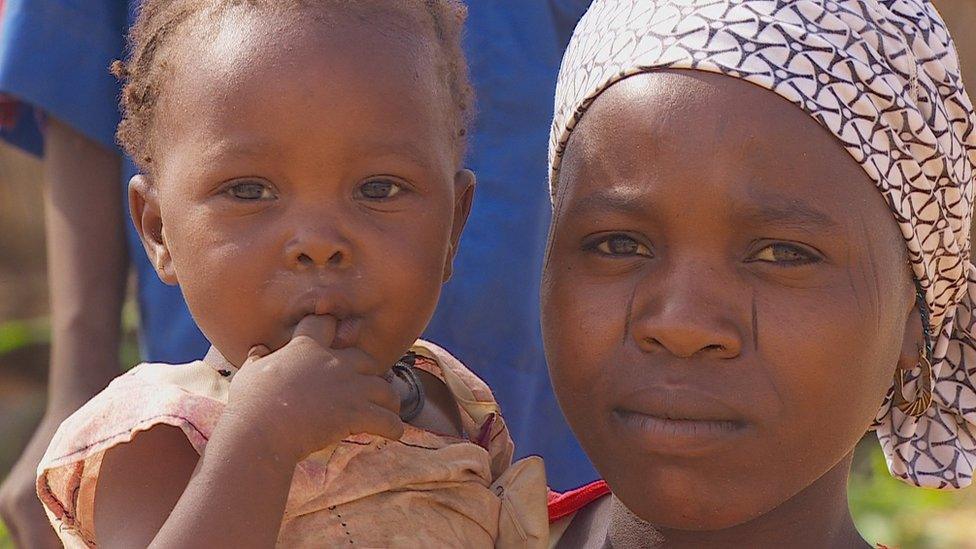Can Ethiopia be Africa's leading manufacturing hub?
- Published
Can Ethiopia create enough jobs for its growing population?
With Ethiopia having the second biggest population in Africa, it is under growing pressure to tackle unemployment. The BBC's Alastair Leithead visited the country to find out how it is tackling the problem.
The factory workers sing Ethiopia's national anthem in unison as one shift ends and another prepares to begin.
Outside, a fleet of passenger buses pulls into Hawassa Industrial Park, as thousands of textile workers - most of them women - switch places.
The new arrivals take up their stations behind sewing machines, ironing boards and cutting tables as the shirts and suits start taking shape.
The park, claimed to be the biggest in Africa, is 140 hectares (350 acres) of factories, with a water treatment plant and its own textile mill.
Six months after opening in southern Ethiopia, 10,000 people already work here, and at full capacity it is expected to provide 60,000 jobs.
"The pay isn't great," says one 20-year-old, who trained for six months to sew and cut.
"But it's not just about money. Opportunities are being created for people like me across the country."
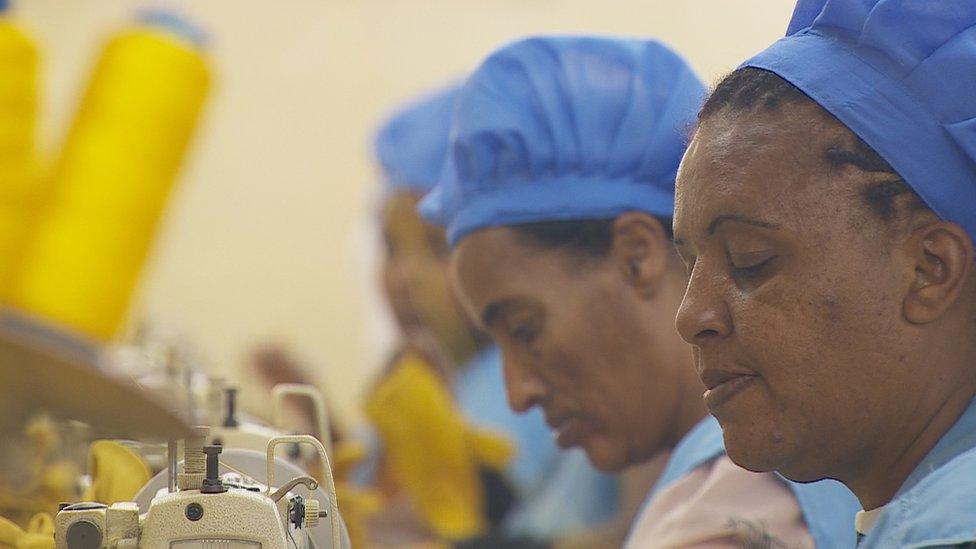
Labour costs in Ethiopia are low for foreign firms
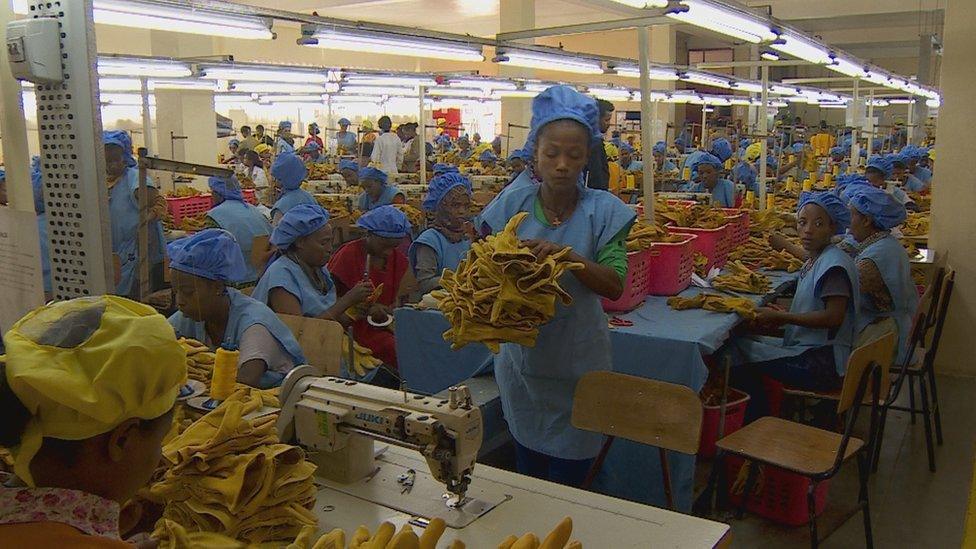
The government hopes that the Hawassa Industrial Park will create 60,000 jobs
There's an optimism among the workforce that this is a good spring-board for running their own businesses in the future.
And it is just one of more than a dozen industrial parks being built across Ethiopia.
"Expanding and building world class industrial parks is a model we have chosen," said Arkebe Oqubay, Prime Minister Hailemariam Desalegn's special adviser and the architect of Ethiopia's industrial revolution.
'Learning from China'
With Africa's population predicted to double by 2050, providing jobs is the key to taking advantage of a vast, and expanding young workforce.
"The population is growing by about 5% so we need to create close to one million jobs every year," said Mr Arkebe.
"Population growth…is not only a challenge, but also an opportunity…if it's linked with quite rapid economic growth."
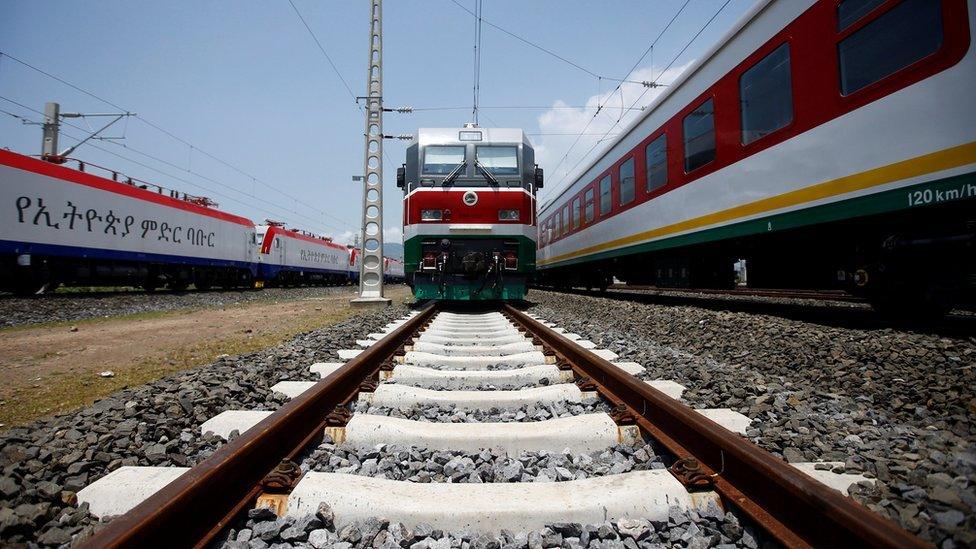
Chinese firms have invested heavily in the transport sector
Ethiopia is building for the future, and the scale and ambition is impressive.
Not just industrial parks, but vast affordable apartment blocks are being built, along with a new national road network and an electrified railway line to the port in neighbouring Djibouti.
"We can learn from China that making investment in the long-term, in infrastructure, is quite important. We have seen China emerge from low level, into being a manufacturing powerhouse," said Mr Arkebe.

Hawassa Industrial Park: Key facts
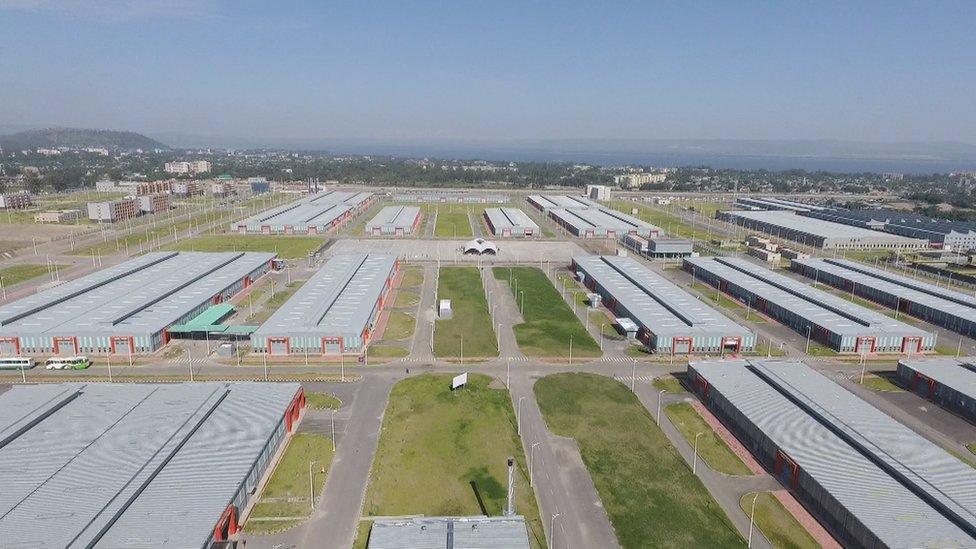
Ethiopia's biggest industrial park
Built in nine months by a Chinese contractor
Hosts 18 companies from 11 countries
Solely for textile and apparel
At capacity, will employ 60,000 workers
Zero-emission water treatment plant recycling 90% of effluent

China is just one of many models that Ethiopia is learning from, but like the Asian powerhouse, Ethiopia closely controls its economy.
It also closely controls political opposition, and has been criticised for a lack of freedom of speech and human rights.
A nearly nine-month state of emergency was only recently lifted. Protests are crushed and opponents jailed.
But at Hawassa University, graduate student Woyneab Habte has recently returned from studying in the US, and she balances economic growth with freedom of speech and democracy.
"It's not like one is more important than the other," she said.
"But definitely, economic growth is a means towards democracy - it's a path for democracy, it's a path for freedom of speech, because if there is no education in the country, if people are still hungry, what are they going to speak about?"
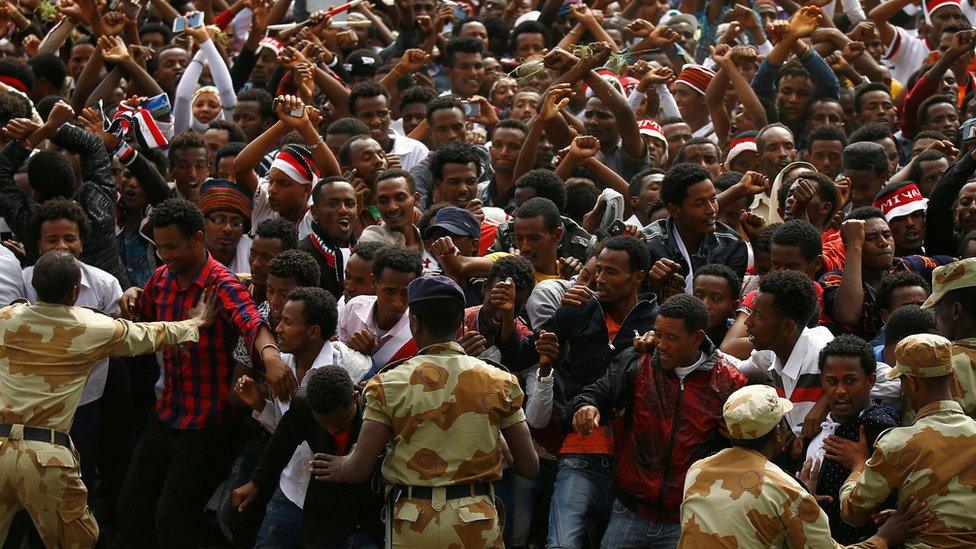
Opposition groups have been demanding greater political freedom
Mr Arkebe admits that it is a work in progress.
"Building democracies, and sustaining them, requires effort for many generations, and we recognise that, and we are going to put more effort despite the achievements we have made," he said.
For international investors a strong government is a real attraction.
'Aggressive and ambitious'
At Hawassa's official opening ceremony, senior representatives of the 18 companies from 11 foreign countries investing in the park gathered under a big tent to hear the prime minister speak.
"Look, we came and looked at all of Africa - all of sub-Saharan Africa - and after a year we really landed on Ethiopia," said Bill McRaith, chief supply chain officer for PVH.
The huge American apparel company that owns Calvin Klein and Tommy Hilfiger among others has opened a factory in the park.
"There's a relatively stable government, actively involved in making this work, and when it came to all the normal dynamics of labour costs, power etc. it fitted the bill perfectly."
With a cheap source of labour, good incentives and a growing market, Ethiopia is being seen as an alternative to Asia.
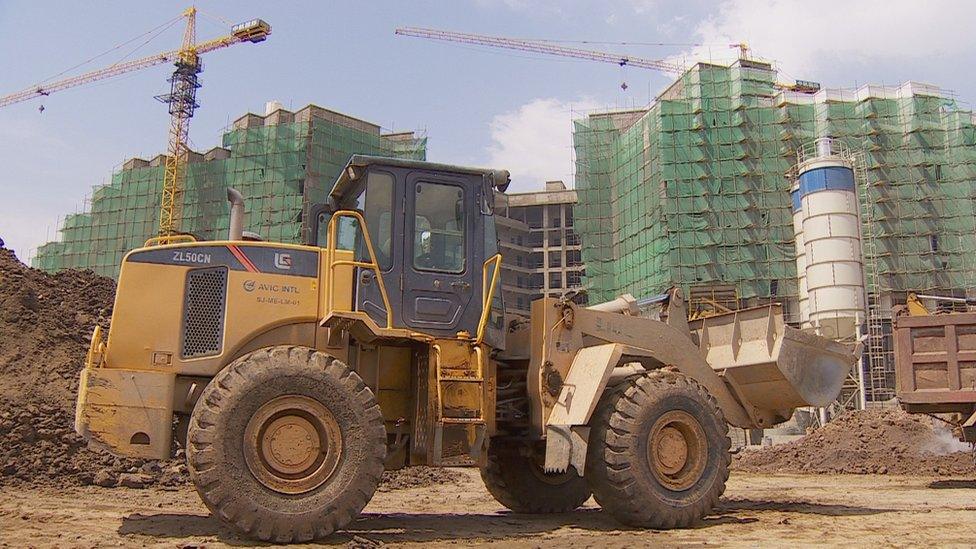
The government hopes that Ethiopia will be a model for development
"Why did we choose Ethiopia? Firstly, it has a stable political situation and a peaceful society," said Yang Nang, general manager of the Wuxi Group, which runs the textile mill.
"Secondly, it has 100 million people and is the second biggest country in Africa. For our textile business, without a big population there is no market.
"Thirdly, the production and labour cost is very low. This attracts our investment."
Ethiopia has set itself an ambitious target known as Vision 2025 - to be the leading manufacturing hub in Africa.
"The aim is that GDP will grow by 11% annually for the coming 10 years and the manufacturing sector will grow by about 25% every year," said Mr Arkebe.
"It provides an opportunity for what we call the demographic dividend, but without having a policy as very aggressive and ambitious as Ethiopia's target for economic growth, it will be difficult and it will be a source of crisis," he added.
Industrialisation is not the only answer to Africa's population explosion, but it is already creating dividends for Ethiopia.
If it gets the balance right, it could be a model to put a continent to work.

Read more on Africa's growing population:
How Africa's population boom is changing our world

- Published2 January 2024
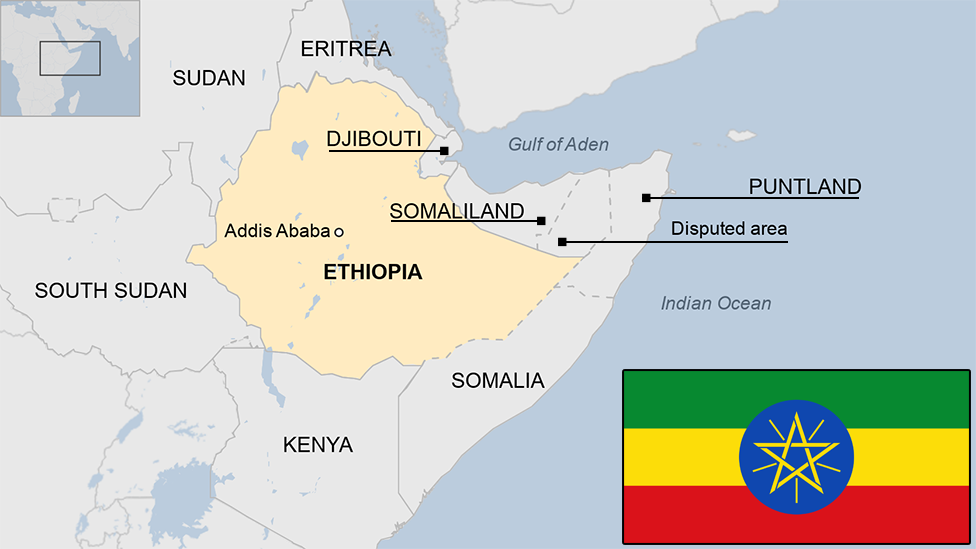
- Published5 July 2017
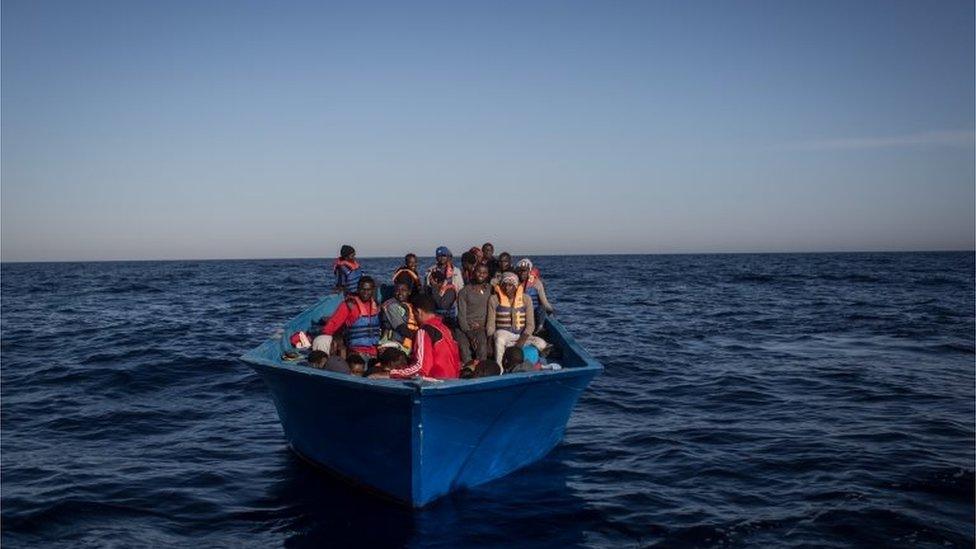
- Published20 July 2017

- Published23 August 2017
